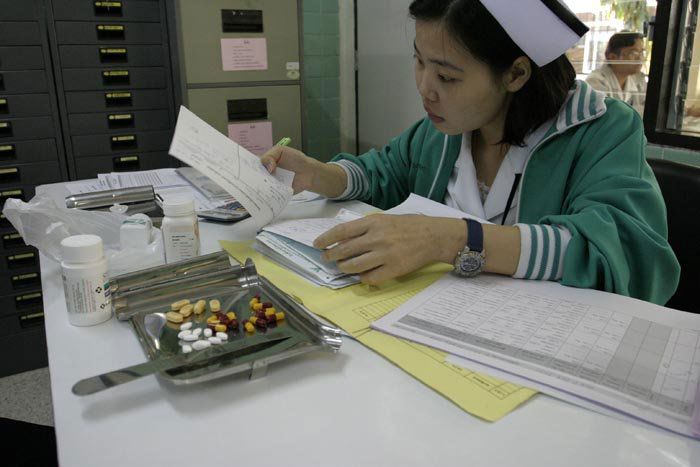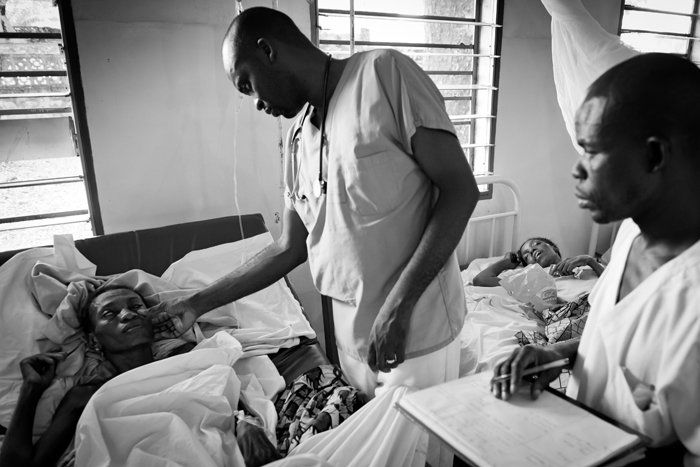“We handed over many treatment programmes in Latin America and Asia to local authorities in the confidence that they would be able to provide people with the treatment they needed to stay alive. Higher drug prices will create real funding challenges for some middle-income countries.”
- Dr Tido VON SCHOEN-ANGERER, Executive Director, MSF Access Campaign
Stuck in the middle: drug companies push up prices for patients in middle-income countries
People living with HIV in middle-income countries like India, Brazil or Thailand are facing huge hikes in the costs of AIDS medicines – at a time when the pharmaceutical industry sees these countries as potentially lucrative markets for high-priced drugs, and ‘blockbuster’ drugs go off-patent in wealthy countries.
This year, a number of drug companies confirmed an ongoing trend by refusing to extend standardised price discounts to middle-income countries—something which was previously routine practice. ViiV, Merck, Johnson & Johnson and Abbott all now specifically exclude middle-income countries from standardised price discounts for some or all of their drugs. Countries are thus forced to negotiate on a case-by-case basis, which is likely to lead to higher prices.
This move ignores the fact that the majority of people in middle-income countries can’t afford to pay high prices for medicines. To add to the problem, these countries are now losing the support from global health mechanisms like the Global Fund.
The price of a WHO-recommended first-line HIV regimen has fallen, thanks to competition among producers, to around US$ 150 a year. But where patents stand in the way and countries cannot access the more affordable generic products, middle-income countries are left paying – at best – around $1000. Newer treatment options like raltegravir, darunavir or etravirine, cost several times more.
People in many middle-income countries are also cut out from the benefits of the Medicines Patent Pool’s first licence agreement with a drug company, Gilead, signed in July. Though the licence will allow generic manufacturers to boost production of more affordable versions of Gilead’s HIV medicines for some, in countries like Ukraine, China, Thailand or Indonesia, people will not receive these more affordable versions as a result of the deal.
Voluntary methods to ensure medicines are priced affordably, like the Patent Pool, do have a role to play when patents stand in the way of price-busting generic competition. But drug companies must ensure that their licences open up access to affordable medicines for all developing countries.
- Dr Tido VON SCHOEN-ANGERER, Executive Director, MSF Access Campaign
Stuck in the middle: drug companies push up prices for patients in middle-income countries
People living with HIV in middle-income countries like India, Brazil or Thailand are facing huge hikes in the costs of AIDS medicines – at a time when the pharmaceutical industry sees these countries as potentially lucrative markets for high-priced drugs, and ‘blockbuster’ drugs go off-patent in wealthy countries.
This year, a number of drug companies confirmed an ongoing trend by refusing to extend standardised price discounts to middle-income countries—something which was previously routine practice. ViiV, Merck, Johnson & Johnson and Abbott all now specifically exclude middle-income countries from standardised price discounts for some or all of their drugs. Countries are thus forced to negotiate on a case-by-case basis, which is likely to lead to higher prices.
This move ignores the fact that the majority of people in middle-income countries can’t afford to pay high prices for medicines. To add to the problem, these countries are now losing the support from global health mechanisms like the Global Fund.
The price of a WHO-recommended first-line HIV regimen has fallen, thanks to competition among producers, to around US$ 150 a year. But where patents stand in the way and countries cannot access the more affordable generic products, middle-income countries are left paying – at best – around $1000. Newer treatment options like raltegravir, darunavir or etravirine, cost several times more.
People in many middle-income countries are also cut out from the benefits of the Medicines Patent Pool’s first licence agreement with a drug company, Gilead, signed in July. Though the licence will allow generic manufacturers to boost production of more affordable versions of Gilead’s HIV medicines for some, in countries like Ukraine, China, Thailand or Indonesia, people will not receive these more affordable versions as a result of the deal.
Voluntary methods to ensure medicines are priced affordably, like the Patent Pool, do have a role to play when patents stand in the way of price-busting generic competition. But drug companies must ensure that their licences open up access to affordable medicines for all developing countries.



